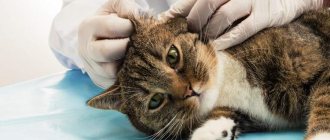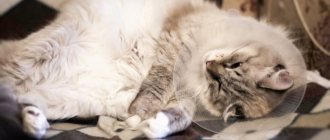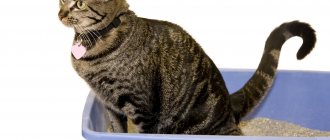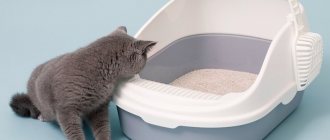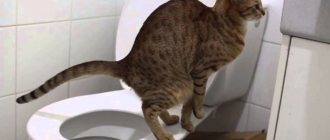Should a healthy cat smell?
Nature took care of the hunting cat and provided for the absence of smell. “Washing” the cat is of great importance. Animal saliva contains lysozyme. This is an enzyme that, when contacted by microorganisms, immediately destroys their membranes.
The smell of flesh is the smell of microorganisms. It is they who, by multiplying, reveal their presence. The higher the population, the stronger the odor emanating from the microbe's breeding site. By destroying the microflora on itself, the cat normalizes it and prevents reproduction.
The cat washes itself often because the enzyme is very unstable. When it comes into contact with air, it quickly breaks down and must be applied again and again. If a cat feels good, it will not be lazy. Constant washing is a guarantee that there will be no odor.
How to treat
Before doing anything, you need to conduct an examination on the animal, after which the veterinarian will make an accurate diagnosis and prescribe treatment. You should not self-medicate, as this can lead to more serious consequences.
If the cause of the smell of rotten fish from the mouth is diseases of the oral cavity or tartar on the teeth, then the animal needs regular teeth cleaning and other procedures. All these methods are carried out in a veterinary clinic. After this, owners should brush their teeth themselves for preventive purposes. Special gels, brushes, and solutions are sold for kittens that will help get rid of the problem.
If a kitten is found to have caries, periodontitis, tumors with pus, chipped teeth, etc., then it will require surgical intervention. This is the only way to remove stone from teeth or remove a tooth.
A good owner will check their kitten's mouth regularly. If plaque, ulcers or wounds appear there, this indicates an infection. In this case, you should consult a veterinarian.
If the cause lies in the stomach, intestines, kidneys or liver, then the kitten’s mouth may smell rotten. You can get rid of such reasons only after undergoing tests and examinations.
© shutterstock
Sources of unpleasant odor from cats and their prevention
An unpleasant-smelling animal cannot cause disgust; it should alert you. Pathologies in the body can happen at any time. Finding out the cause of the smell in a timely manner and providing assistance will help you quickly deal with the problem.
Odor from wool and leather
Pathological processes on the animal's skin may not be visible due to the presence of fur. In this case, the smell gives away the problem.
To establish the location, you need to examine the animal. It is enough to carry out palpation. Starting from the head with your fingers, moving through the cat’s skin, you need to move towards the tail. If, upon palpation, irregularities are detected, they should be inspected by spreading the hair. In case of pain, the animal will give away the location of the pathology by its reaction to pain.
Upon examination you can identify:
- papules (nodules);
- pustules (ulcers);
- vesicles (air bubbles);
- abscess (limited purulent inflammation);
- phlegmon (not limited purulent inflammation);
- scabs (crusts of dried tissue and purulent masses);
- scales (dry dead tissue).
As a rule, in the initial stages, during the ripening process, there may be no smell. It appears when the tissues are lysed and the purulent masses go beyond the process itself.
Characteristic reasons
Many cat owners neglect to care for their pet's oral cavity. As a result, a slightly perceptible unpleasant odor turns into a real stench that cannot be ignored. In medical terminology, there is a special term for bad breath due to some disease - halitosis.
The appearance of halitosis is often associated not only with infection or other problems in the oral cavity, but also with diseases of the internal organs. That is why you should immediately seek advice from a veterinarian to prevent a more serious problem.
The appearance of odor does not depend on the age of the animal, however, it is possible to identify the main causes of the problem that are characteristic of a certain age category.
For kittens
Since kittens, as a rule, are too small to have serious diseases of the internal organs (unless we are talking about pathology), the reason for the bad smell is related to age specifics or problems of the oral cavity itself:
- untimely or incomplete replacement of teeth: the molars have already appeared, but the milk teeth have not yet fallen out;
- malocclusion;
- mechanical damage (trauma) to the mouth;
- a foreign body stuck between the teeth or behind the gums: too hard cartilage or a small bone that remains in the mouth and begins to rot can cause the problem.
For adult cats
This group includes animals aged 1–8 years. The most active category, at risk of mechanical damage. Most likely reasons:
- problems with teeth and gums: if you do not pay attention to dental procedures, then over time tartar appears on your pet’s teeth. It gradually pushes the tooth away from the gum, and cracks appear in which food accumulates. Decomposition of food is accompanied by a strong smell of rot. Periodontal disease, gingivitis, pulpitis and caries are almost always accompanied by bacterial infections, which are also accompanied by unpleasant odors;
- stomatitis: the oral mucosa can be a real breeding ground for bacteria, fungi and viruses, which contribute to tissue death and the occurrence of halitosis. Stomatitis can also occur as a result of diseases of the salivary glands;
- injuries received (in particular, damage to the jaw), which can provoke an inflammatory process, as a result of which the mouth begins to smell bad.
For older pets
In animals older than 9–10 years, halitosis most often indicates diseases of the internal organs, which is why it is not at all easy to get rid of it, as well as to eliminate the root cause (due to age):
- different types of neoplasms;
- problems with internal organs (damage, infections, chronic diseases);
- consequences of improper functioning of internal organs: diabetes, kidney failure.
Hygiene rules for cats
A healthy cat takes care of itself. She spends a third of the day on this. However, the owner is also obliged to take part in this.
Cat hygiene consists of caring for:
- skin and hair. This includes bathing, combing while simultaneously examining and palpating the skin. To do this, you can use special shampoos and foams, combs and comb mittens. (For long-haired ones, you need a set of different combs). The animal should be bathed 2 times a month; hairless breeds that sweat profusely in summer should be bathed daily. If the animal is unwell, bathing is not used. You need to comb it 2 times a week (daily during the molting period);
- ears . They should be cleaned with a cotton swab dipped in warm water or zoo lotion. Using smooth movements and turning the swab clockwise, you can easily clean your cat's ears. If the accumulation of dirt is large, dry and old, then you can drop a few drops of lotion, sunflower oil or water into the cavity. The animal will shake out the excess, and what remains will soak the crusts. Next, you can use a cotton swab. The hygiene procedure is carried out once a week;
- oral cavity. The removal of stones and plaque should be carried out by a specialist in the clinic. For prevention, the cat should be given solid food and allowed to chew on soft bones and cartilage.
Treatment of oral pathologies
When a cat's breath smells bad and rotten, treatment most often involves dental or surgical removal of the source of the infection. The doctor can sanitize the oral cavity, removing tartar and diseased teeth, and also prescribe anti-inflammatory therapy. If an abscess, a fistula, or a tumor has grown in the mouth, then surgery may be required.
Of course, you can buy a special disinfectant for the oral cavity at a veterinary pharmacy, such as, for example, Stomadex plates, but it will only help if there is mild inflammation. If there is no effect, we advise you not to delay visiting a veterinarian, because the consequences of oral diseases can be quite serious.
What canned food tastes best for cats?
RESEARCH ATTENTION! You and your cat can take part in it! If you live in Moscow or the Moscow region and are ready to regularly observe how and how much your cat eats, and also remember to write it all down, you will receive FREE SET OF WET FOOD.
Project for 3–4 months. Organizer - Petkorm LLC.
Want to participate? Call!
7
We suggest you read: Rectal prolapse, rectal prolapse in a cat
Antibiotics (for example, ampicillin, cephalexin, clindamycin, enrofloxacin) are used to treat bacterial skin diseases. There are other methods:
- Local treatment. Shampoos and conditioners containing benzoyl peroxide (eg, Oxidex) or chlorhexidine (eg, Hexadene) may be prescribed. In the area where the bacterial infection is localized, you can use Bactoderm.
- The minimum treatment period for superficial pyoderma is 3 to 4 weeks, and for deep pyoderma - 8 weeks.
- In severe cases, combination therapy is prescribed. It is important to know that griseofulvin is not effective in treating fungal infections. Ketoconazole, itraconazole and fluconazole may be prescribed to treat Malassezia dermatitis.
- Local treatment is effective in mild cases, but in severe cases, selenium sulfide is usually used (effective in 65 percent of cases).
- Ketoconazole (Nizoral) shampoo is approved in many countries for the treatment of seborrheic dermatitis in humans and is also used to treat Malassezia dermatitis in dogs.
- 2-4 percent chlorhexidine is effective against fungus.
- The use of miconazole or derazol is also successful.
- Rinsing fungal-affected skin areas with vinegar and water is a cheap and effective treatment.
Healthy feeding rules
The cat is a carnivore. The basis of the diet should be animal feed:
- meat;
- fish;
- eggs;
- dairy products.
Practice shows that constant feeding of dry food, even the most “promoted” brands, does not add health. Among these “eaters” there are no long-livers. Humans are not yet able to select an animal’s diet with molecular precision so that it is balanced by:
- natural proteins;
- carbohydrates;
- fats;
- minerals;
- vitamins.
Associated symptoms
Halitosis (stinky odor) is not the only symptom that may concern the owner. In addition, your pet’s appetite may decrease and it becomes difficult for him to chew food, especially hard food.
A cat's bad breath may be accompanied by diarrhea or constipation. In this case, the cause is diseases of the digestive tract.
If strong thirst, changes in weight up or down, weakness, indifference to everything, and the smell of acetone from the mouth are added to the stench of the mouth, then this indicates diabetes mellitus.
In combination with the stench, frequent urination and pain when going to the toilet can be observed, all this indicates diseases of the urethra.
If accompanied by increased salivation
This is one of the signs of stomatitis. In this case, the cat’s breath smells like rotten meat. In addition to stomatitis, the smell of rotten meat may indicate infectious processes in the body, the presence of a foreign body in the oral cavity, or kidney failure.
Accompanying tooth loss
Some cat breeds are highly prone to oral diseases, especially Persians and Abyssinians. An owner who does not monitor his pet’s nutrition, as well as the condition of his oral cavity, leads to the fact that his ward loses his teeth early.
If the following symptoms appear, you need to visit a veterinarian:
- putrid smell.
- swollen gums.
- strong salivation.
- loss of appetite or complete refusal of food.
If such signs are present, you should immediately contact a veterinarian. No one can make a diagnosis on their own. The doctor will examine the animal, take the necessary tests, and determine the reasons for the cat’s strong breath.
During the examination, an x-ray is used, which allows you to identify diseases of the bones or teeth, and will also show a tumor, if any. An ultrasound will determine the condition of the internal organs and their size.
If it is difficult to determine the cause of the stench, your doctor may recommend an endoscopy. This procedure is carried out using a thin tube that is placed into the digestive tract. At its end there is a camera that will show the state of the gastrointestinal tract.
Typically, diagnosis of the disease consists of urine, feces and blood tests, x-rays, ultrasound and a swab from the kitten's mouth.
© shutterstock
When to contact a veterinarian
Considering that a healthy animal does not smell, any smell that is unusual for the owner should be the reason for a visit to the veterinarian.
You cannot debug a visit for a long time. Microflora develops very quickly. Purulent processes tend to end in sepsis and death of the animal.
You should consult a doctor immediately if:
- the animal is oppressed;
- elevated body temperature was recorded;
- the cat shows aggression and constant interest in the problem area;
- inflammatory purulent processes were found on the skin;
- the smell is “smelled” from the nose and other symptoms quickly join it;
- the cat shakes its head, discharge and an unpleasant odor are visible;
- prenatal processes are not typical with a foul odor;
- postpartum discharge is profuse and there is a stench;
- the anus is inflamed and smells unpleasant.
When contacting a doctor, laboratory and clinical examinations will be performed.
If necessary, the doctor will prescribe:
- dermatological shampoos;
- antibiotics;
- ear drops;
- change of diet;
- surgical intervention.
Care and maintenance
You should bathe your cat using medicated shampoos. Benzoyl peroxide is an excellent antibacterial agent (for example, Oxidex). You can also use other shampoos containing miconazole or ketoconazole (for example, Nizoral).
For effective treatment, shampoo must be applied to the pet’s skin and not rinsed off for 10-15 minutes.
Your veterinarian may prescribe antibiotics or antifungal medications to treat the infection. It is necessary to adhere to all doctor's instructions and take medications regularly.
We suggest you read: Seizures in cats, what to do
If your pet has relapsed, you will need to contact your veterinarian for more appropriate treatment.
How to get rid of unpleasant odors in your apartment and home
Many owners solve the problem of odors radically - wash everyone, wash everything and wash it. However, without finding out the cause and providing assistance, the method can have a lightning-fast effect, but not long-lasting.
Seeing a doctor, establishing a diagnosis and providing the animal with proper care will help quickly eliminate the foreign odor.
Of the most harmless deodorizing agents, you can use a solution of potassium permanganate. It is enough to place containers with a saturated solution around the house. The prepared product should be changed when the color turns brown.
Modern chemical products (such as “Anti-odor”) can be purchased both at pet stores and in household chemical stores. They will help temporarily, but will not solve the problem.
To prevent unpleasant odor from becoming a problem, you need to constantly monitor the diet and health of the animal.
Types of problem
A putrid stench indicates digestive problems. Most often this happens from cheap, low-quality feed. Also, a rotten smell is accompanied by helminths. But any disease of the gastrointestinal tract, even indigestion, can be accompanied by such a smell.
Ammonia
The ammonia spirit will report diseases of the kidneys and the urinary system as a whole. Kidney failure cannot be completely cured, but a cat's body can be maintained in near-normal condition for a long time.
Sweet smells
A cloying sweetish smell, perhaps the aroma of rotten meat, signals problems with the liver.
Acetone or vinegar
The smell of acetone or apple cider vinegar, overripe apples, indicates diabetes. This disease has recently become increasingly common in cats.
